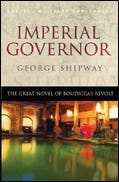Narrated in the form of a memoir, Imperial Governor is a compelling portrait of Gaius Suetonius Paulinus, the Roman general and first-century Governor of Britannia who destroyed Britain's Druids and shattered the bloody revolt led by Queen Boudica of the Iceni.
When Emperor Nero hands him the governorship of Britain in A.D. 58, Suetonius' elation is tempered by the knowledge that it could well prove to be a poisoned chalice. Though he relishes the challenge, his mandate gives him concern: Britain must return a profit. Rome's economy demands Britain’s largely untapped resources of metal, and Suetonius is tasked with subjugating the unmined ore's tribal Celtic owners. Meanwhile, civil authorities initiate a program of taxation and recall of Roman-sponsored loans which will effectively beggar Rome's native British allies. Trouble clearly lies ahead and trouble there is, two years into Suetonius' tenure, as Roman greed pushes the settled tribes into savage rebellion.
The relentless machinery of Roman conquest in action has seldom been better depicted. Ruthlessly methodical military organization goes hand in hand with meticulous bureaucracy and an impressive intelligence service. Even on campaign, Suetonius travels with a flock of slaves, secretaries, administrators and inquisitors.
Imperial Governor is a powerful, hard-hitting story. Shipway makes no concessions to modern sensibilities. His characters possess the beliefs and attitudes of their own time and act accordingly. Suetonius himself is an autocrat, accustomed by virtue of noble birth and military rank to instant deference. Though not without sensitivity, he refuses to indulge it. Duty to Rome is his imperative, and he is a hard man, emotionally distant and intolerant of weakness in others. He is, however, an admirable commander: an astute military strategist, audacious and cool under pressure. His men respect him and he in turn is fiercely proud of his troops. Suetonius' inspired tactics save Britain for Rome, but in the end the uncompromising soldier is outflanked and ultimately defeated, not by the Britons but by the Roman politicians he despises. (originally published 1968, reissued 2003 by Cassell Military Paperbacks; 408 pages, including a map of Roman Britain in 61 AD and an appendix detailing the Order of Battle of the Roman Army in Britain)



